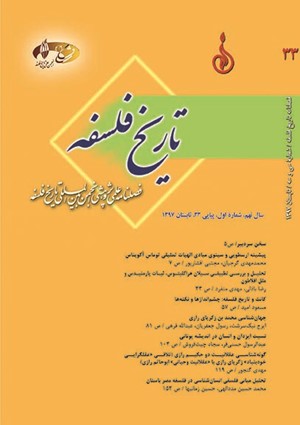تحليل مباني فلسفي انسانشناسي در فلسفه مصر باستان
محورهای موضوعی : یافتههای نو درباره چهرهها و مدرسههای فلسفی ایران و جهان اسلاممحمد حسین مدد الهی 1 , حسین زمانیها 2 *
1 - دانشگاه شاهد
2 - دانشگاه شاهد
کلید واژه: فلسفه مصر باستان فلسفه¬ يونان هستيشناسي مآت انسانشناسي ,
چکیده مقاله :
يونانيان از مدتها پيش از ظهور تالس در قرن ششم قبل از ميلاد، با فرهنگ مصر آشنايي نزديک داشته و از دانش آنها بخصوص در حوزه رياضيات بهره فراوان برده اند. در حوزه فلسفه نيز مطالعات اخير نشان ميدهد که تالس از نزديک با تفکر مصر باستان آشنا بوده و در مباحث فلسفي خود متأثر از انديشههاي مصريان باستان بوده است. در تفکر مصريان باستان برغم بهرهگيري از اسطورهها براي تحليل و تبيين حقايق جهان هستي، رگههايي از تفکر فلسفي به معني خاص آن نيز ديده ميشود. در تفکر مصر باستان در مباحثي همچون هستيشناسي، سياست و جامعه و انسانشناسي رگههايي از تفکر ناب فلسفي مشاهده ميشود؛ تفکري که بر محور مفهوم عميق و ذو ابعاد «مآت» شکل ميگيرد. مآت در عرصه هستيشناسي بمعناي نظم، در عرصه سياست و جامعه بمعناي عدالت و در عرصه انسانشناسي بمعناي راستي و درستي است. در عرصه انسانشناسي بطور خاص مصريان باستان بر اين عقيدهاند که وجود انسان داراي ابعاد و مراتب نهگانهيي است که در بين اين ابعاد و مراتب نوعي وحدت حاکم است. آنچه باعث ظهور تام اين مراتب و بخصوص آخرين مرتبه آن يعني تفکر و انديشه و بتبع آن جاودانگي انسان است، تبعيت از مآت يا قوانين حاکم بر نظام هستي است. بدين شکل، ايشان بين انسانشناسي و هستيشناسي خود ارتباطي نزديک ايجاد ميکنند.
The Greeks were familiar with Egyptian culture long before Thales in the 6th century BC and greatly benefitted from their teachings particularly in the field of mathematics. Recent studies in the realm of philosophy also indicate that Thales had a thorough knowledge of ancient Egyptian philosophy and was influenced by it in developing his own philosophical views. In ancient Egyptian philosophy, in spite of resorting to myths in order to analyze and explain the truths of the world, there are also some traces of philosophical thought in its particular sense. For example, there are some traces of pure philosophical thought in the realms of ontology, politics, sociology, and anthropology. This kind of philosophical thought is formed based on the profound and multi-dimensional concept of ma’at. This word means order in the field of ontology, justice in the field of politics and sociology, and honesty in the field of anthropology. Within the domain of anthropology, ancient Egyptians specifically believed that Man’s existence has nine grades and dimensions which enjoy a kind of unity among themselves. What has led to the final emergence of such grades, particularly the last grade called thought, and, thus, Man’s eternity, is following ma’at or the laws governing the order of being. Accordingly, they establish a tight relationship between their ontology and anthropology.
Asante, M. K., “The Idea of the Soul in Ancient Egypt”, Gaudium Sciendi, 6 Number, 2014.
Ashby Muata, The Mystical Chapters of the Rau nu Prtm Hru: The Ancient Egyptian Book of Enlightenment, Miami: Cruzian Mystical Books, 2000.
Bleiberg, Edward, Arts and Humanities through the Eras, Ancient Egypt 2675-332 BCE, Detroit: Thomson Gale, 2005.
Bleiberg, Edward, To Live Forever: Egyptian Treasures from the Brooklyn Museum, NY: Brooklyn Museum, 2008.
Budge, Wallis, the Gods of the Egyptians, vol. 1, Chicago: Open Court Publishing Co., 1904.
Bunson, Margaret R., Encyclpedia of Ancient Egypt, New York: Facts On File, Inc, 2002.
Burnet, John, Greek Philosophy: Thales to Plato, London: A & C Black Ltd, 1920.
Copleston, Frederick, A History of Western Philosophy, vol. 1, London: Continuum, 2003.
Dicks, D. R., “Thales”, Cambridge The Classical Quarterly, Cambridge University Press, 9 Number, 1959.
Fletcher, Colin. R.,“Thales-our Founder?”, London: The Mathematical Gazette, The Mathematical Association, vol. 66, 438, 1982.
Graness, Anke, “Writing the History of Philosophy in Africa: Where to Begin?”, Journal of African Cultural Studies: 1-16, 2015.
Hallen, Barry, “A Short History of African Philosophy”, Indiana: Indiana University Press, 2002.
Harris, Eleanor L., Ancient Egyptian Divination and Magic, Boston: Red Wheel Weiser, 1998.
Ikram, Salima, Death and Burial in Ancient Egypt, Harlow: Longman, 2003.
Ikram, Salima, Ancient Egypt: An Introduction, Cambridge: Cambridge University Press, 2009.
Lef kowitz, Mary, Not Out of Africa: How Afrocentrism Became an Excuse to Teach Myth as History, New York: Basic Books, 1996.
Lichtheim, Miriam, Ancient Egyptian Literature, Volume I: The Old and Middle Kingdoms, California: University of California Press, 2006.
Miniaci, Gianluca, “The Case of the Third Intermediate Period ‘Shabti-Maker (?) of the Amun Domain’ Diamun / Padiamun and the Change in Conception of Shabti Statuettes”, The Journal of Egyptian Archaeology, London: Sage Publications, 100, 2014.
Nardo, Don, Exploring Cultural History - Living in Ancient Egypt, Detroit: Thomson Gale, 2004.
Shaw, Ian, The Oxford History of Ancient Egypt, Oxford, London: Oxford University Press, 2003.
Uzdavinys, Algis, Philosophy as a Rite of Rebirth: From Ancient Egypt to Neoplatonism, Wiltshire: The Prometheus Trus Publication, 2008.
Žabkar, Louis V., A Study of the Ba Concept in Ancient Egyptian Texts, Chicago: University of Chicago Press, 1968.
Ziskind, Bernard and Halioua, Bruno, “La conception du cœur dans l’Égypte ancienne”, Med Sci, volume 20, 3 Number, Paris, 2004.

